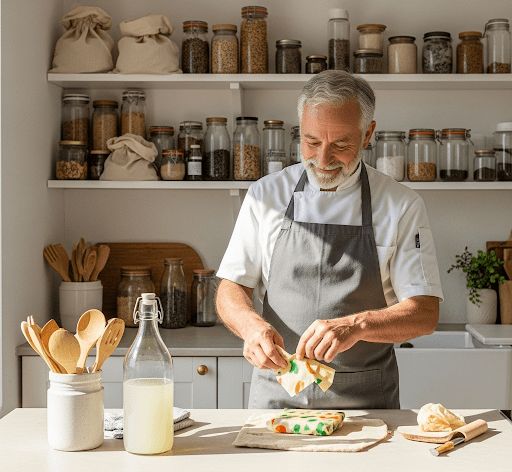The kitchen is where a lot of waste happens, but it’s also the best place to start living zero-waste. In today’s world, convenience often comes with a hidden cost—our environment. One of the easiest and most impactful ways to live more sustainably is by starting right in your kitchen.
Think about it: the kitchen is where most of our household waste is created. From food scraps to plastic packaging to excess energy use, it all adds up. But here’s the good news—by making a few small changes to your daily habits, you can turn your kitchen into a hub of low-waste, eco-friendly living.
These 9 simple zero-waste kitchen habits are practical, effective, and easy to stick with—plus, they really work! Ready to take the first step toward a greener kitchen and a lighter footprint? Let’s dive in.
1. Plan Your Meals to Prevent Food Waste
One of the biggest culprits of kitchen waste is buying too much and letting food go bad. Planning meals ahead of time helps you shop with purpose and avoid unnecessary purchases. Why not start with this?
- Create a simple weekly meal plan based on what you already have.
- Write a detailed grocery list and stick to it.
-
Leave room for “leftover nights” to reduce uneaten food
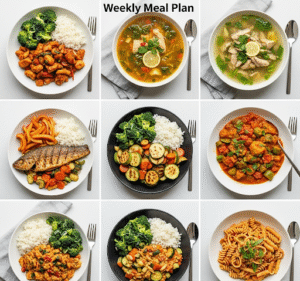
2. Use What You Have Before Buying More
The most sustainable item is the one you already own—and the same goes for food. Before you hit the store, check your pantry, fridge, and freezer. How about this—
Try a weekly “fridge cleanout meal” where you challenge yourself to cook with only what’s left. You’ll be amazed at how creative (and resourceful) you can get!
3. Store Food Properly to Extend Freshness
Proper storage can make your food last days—or even weeks—longer. This means less waste and more money saved. Give this a go—
- Keep herbs in a jar of water in the fridge.
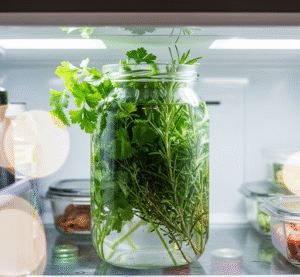
- Use breathable produce bags for fruits and veggies.
-
Label leftovers with the date so they don’t get forgotten.
4. Ditch Single-Use Plastics
Single-use plastics are a major contributor to kitchen waste. Thankfully, there are many reusable alternatives that are better for the environment and your wallet. Why not start with this—
- Beeswax wraps instead of cling film.
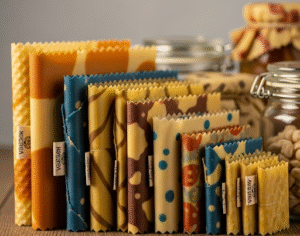
- Silicone bags in place of zip-locks.
-
Cloth towels for paper napkins.
These changes may seem small, but over time, they add up in a big way.
5. Compost Your Scraps
Even with the best intentions, some food scraps are unavoidable. Composting turns your organic waste into nutrient-rich soil instead of methane-producing landfill garbage.
Give this a try—
- Use a countertop bin to collect food scraps.
- Compost veggie peels, eggshells, coffee grounds, and fruit cores.
-
Avoid meat, dairy, and oily foods in home compost systems.
No garden? No problem. Many cities offer community composting or pickup services.
6. Repurpose Food Scraps Creatively
Think before you toss! Many kitchen scraps can be used again in fun and functional ways.
Creative uses—
- Simmer veggie peels and herb stems into homemade broth.
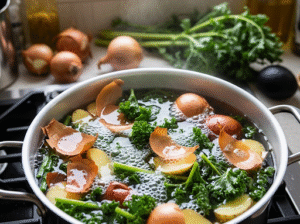
- Use citrus peels for DIY all-purpose cleaners or zest in baking.
-
Regrow green onions, lettuce, or basil in water.
It’s kitchen magic—and totally free.
8. Embrace Reusable Kitchen Essentials
Upgrading your tools can make sustainable living effortless.
Must-haves—
- Mason jars for storage and freezing.
- Reusable dishcloths and napkins.
-
Stainless steel or bamboo dish brushes.
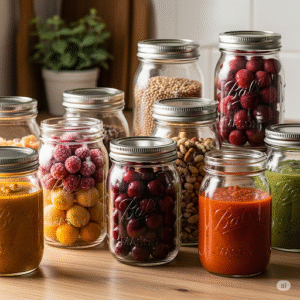
Invest in quality items once, and enjoy long-term savings and less waste.
9. Shop Local & Seasonal
Shopping locally not only supports your community, but also reduces the carbon footprint of your meals. Seasonal produce is fresher, tastier, and often requires less packaging.
Where to look—
- Farmers markets
- Get fresh food from local co-ops or produce boxes.
-
Community-supported agriculture (CSA) programs
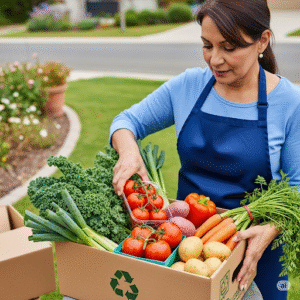
When in doubt, ask what’s in season and grown nearby.
Zero-waste living isn’t about perfection—it’s about progress. By incorporating just a few of these habits into your routine, you can significantly reduce your kitchen waste and feel good doing it.
Start small. Pick one habit to try this week. Maybe it’s composting for the first time, or swapping paper towels for cloth ones. Over time, these choices become second nature—and your kitchen becomes a hub of sustainability.
Stay connected with us for more such lifestyle related articles! Read the latest news of India and the world on Khabari Bandhu – Business, Education, Entertainment, Religion, Cricket, Horoscope and much more.

